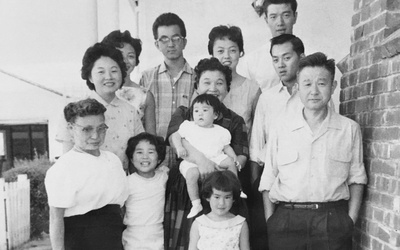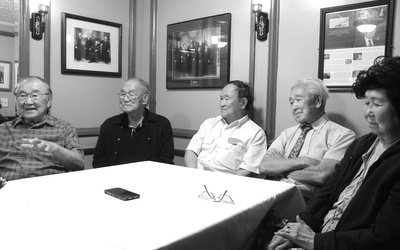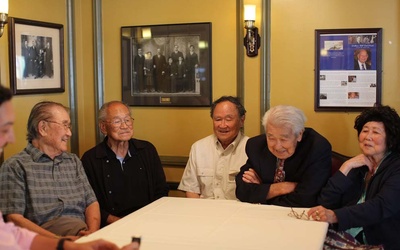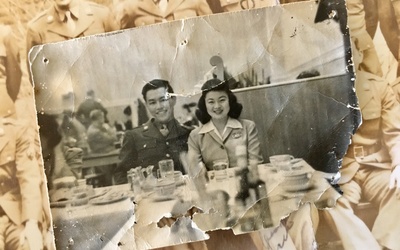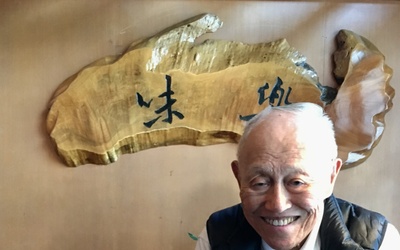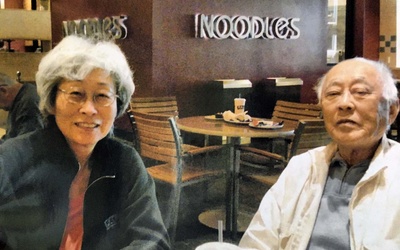Tessaku
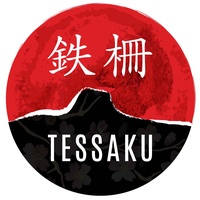
Tessaku was the name of a short-lived magazine published at the Tule Lake concentration camp during World War II. It also means “barbed wire.” This series brings to light stories of the Japanese American internment, illuminating those that haven’t been told with intimate and honest conversation. Tessaku brings the consequences of racial hysteria to the foreground, as we enter into a cultural and political era where lessons of the past must be remembered.
Stories from this series
Mitsuki Mikki Tsuchida - Part 1
Jan. 8, 2018 • Emiko Tsuchida
“Army trucks would pull up and someone would shout down, ‘How many in your family?’ And they would just throw the toilet paper and you had to go pick it up. And that lack of human dignity, it just went on and on.” — Mitsuki Mikki Tsuchida When I first started asking my dad about vivid camp memories, my dad would tell me how the alkaline sandstorms used to force the kids to run and hide, or that the piercing …
The Oka Family - Part 2
Dec. 20, 2017 • Emiko Tsuchida
Read Part 1 Diana Tsuchida (DT): Did you ever feel any sense of prejudice before the war? Eva: Well, we lived on a farm with other Japanese people. We were sharecropping. Our whole school, Orchard School on Gish Road, was three-quarters Japanese. Casey Coe (CC): What did you grow on the farm? George: Raspberries, cucumbers. I had to wake up at 2 o’clock in the morning to help my father irrigate the raspberries. I was just in grade school. CC: …
The Oka Family - Part 1
Dec. 19, 2017 • Emiko Tsuchida
“All my normal U.S. citizens rights were taken away from me, just for what? Japan went to war with America? We were Americans. That’s what I really resent.” — Amos Oka This Oka family roundtable provided a rare opportunity to hear five siblings in their late 80s and early 90s have a candid conversation about their memories from camp and WWII. While some of what the younger siblings remembered was light-hearted play and the older siblings remembered farming and hardship, …
George Shimizu - Part 2
Dec. 7, 2017 • Emiko Tsuchida
Read part 1 How did you and your wife meet? It’s a long story. Do you want to hear it? I do, I’m sure it’ll be a good story. This is in June of 1941, before Pearl Harbor, I get to Los Angeles and I’m staying with the Fujisaka family. So in those days, there were a lot of Boy’s clubs and Girl’s clubs and George Fujisaka [a friend] was a member of the Shamrocks. And my wife to be …
George Shimizu - Part 1
Dec. 6, 2017 • Emiko Tsuchida
“I could hear a sailor behind me saying, ‘White flag, 2 o’clock, four hundred yards.’ Those were magic words, I’ll never forget it.” — George Shimizu MIS veteran George Shimizu has just celebrated his 97th birthday this past June. And in a way that one can only hope to live out their sunset years, his infectious outlook on life and crystal clear memory defies his age. George has lived some extraordinary experiences that cross cultural and national borders: He went …
Grace Izuhara
Nov. 17, 2017 • Emiko Tsuchida
“I remember my father saying how angry he was and that he would never again vote. And he never did." —Grace Izuhara Grace Izuhara’s family was one of the “lucky” few that escaped imprisonment in the camps during WWII, heading east to Utah to work on sugar beet farms, a vital wartime staple. “Lucky,” because despite their independence, anti-Japanese fervor still ran high in their new town of Clearfield, resulting in a few traumatic events that Grace can still picture. …

